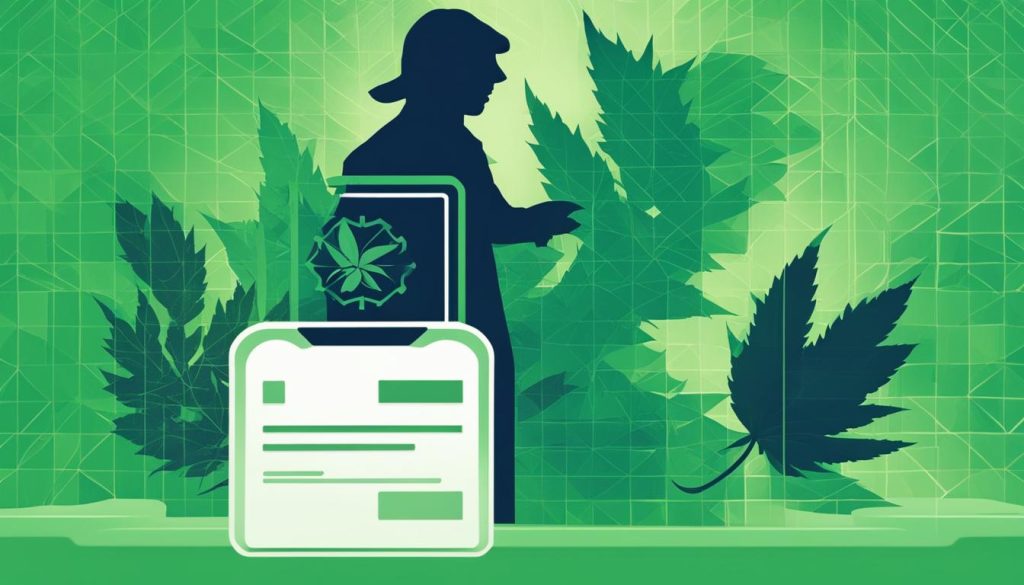
At the intersection of workplace policies and employee rights lies the contentious issue of drug testing for medical marijuana cardholders. As more states legalize the use of medical marijuana, employers face the challenge of balancing their obligation to maintain a drug-free workplace with the legal rights of their employees.
Under current law, employers have the right to implement drug testing protocols to ensure workplace safety and productivity. However, the use of medical marijuana by employees brings into question the fairness and potential discrimination associated with such testing procedures.
In this article, we will explore the intricate landscape of drug testing protocols for medical marijuana cardholders, examining the legal and ethical implications for both employers and employees. We will also discuss the challenges posed by federal regulations and the evolving landscape of marijuana legalization in California.
Key Takeaways:
- Drug testing for medical marijuana cardholders raises concerns about discrimination in the workplace.
- Employers have the right to maintain a drug-free workplace, but must navigate state and federal laws regarding medical marijuana.
- The involvement of Medical Review Officers (MROs) can ensure the accuracy and legitimacy of drug test results.
- Clear workplace policies and communication are essential to address the challenges associated with drug testing and marijuana use.
- Employers should prioritize workplace safety while considering employee rights and legal obligations.
Employer Rights and Drug Testing Policies
Employers have the right to maintain a drug-free workplace and enforce drug testing policies in accordance with federal regulations. The Drug-Free Workplace Act requires compliance from employers working with the federal government, ensuring a safe and productive working environment. Workplace safety is a legitimate concern, as impaired workers can compromise the well-being of themselves and their colleagues, leading to potential accidents and increased insurance premiums.
However, when it comes to drug testing for marijuana impairment, current technology does not provide precise tools for investigation. This poses a challenge for employers, especially in states where recreational or medical marijuana use is legalized. To protect their workplace and employees, many employers choose to adopt zero-tolerance policies, considering any positive result for marijuana as grounds for disciplinary action.
In order to develop effective drug testing policies, employers must consider both federal and state regulations, as well as the specific needs of their industry. Balancing the right to maintain a drug-free workplace with employee privacy and rights is crucial for establishing fair and effective protocols.
Workplace Safety and Drug-Free Policies
In a drug-free workplace, employers have the responsibility to prioritize safety and uphold federal regulations. Ensuring that employees are alert and free from the influence of impairing substances is essential for preventing accidents, injuries, and potential legal repercussions.
While concerns about the accuracy of marijuana impairment testing persist, employers must make informed decisions based on available technology and legal requirements. Utilizing the expertise of Medical Review Officers (MROs) can add credibility and privacy protections to the drug testing process. MROs play a critical role in determining the validity of positive drug test results and verifying whether an individual has a legal explanation for having a substance in their system.
By developing proper protocols, including clear communication, written guidelines, and involvement of MROs, employers can navigate the complexities of drug testing policies while maintaining a drug-free workplace and ensuring the safety of their employees.
Legislation and Protection Laws for Medical Marijuana Users
Legislative attempts have been made to protect the rights of employees who use medical marijuana, but these efforts have faced opposition and challenges. Bills aimed at including drug rehabilitation program completers and employees who use medical marijuana under the Fair Employment and Housing Act have been met with resistance from organizations like the California Chamber of Commerce. The CalChamber supports employers’ rights to maintain a drug-free workplace and opposes legislation that undermines this right. This opposition reflects the complexities and tensions surrounding medical marijuana use in the context of employment.
Under federal law, marijuana remains illegal, and employers have the right to enforce drug testing policies to ensure workplace safety. While some states have legalized medical marijuana, these laws do not provide absolute protection for employees. Employers can still refuse to hire or terminate employees who test positive for marijuana, even if they have a valid medical marijuana card. This creates a legal gray area where state laws conflict with federal regulations, leaving medical marijuana users vulnerable to employment discrimination.
“Legislative attempts to protect marijuana use by employees have faced opposition from organizations like the California Chamber of Commerce.”
The issue of employment discrimination highlights the need for a balanced approach that considers both the rights of employers and the rights of medical marijuana users. Employers have a responsibility to maintain a safe and productive workplace, but they must also navigate the evolving landscape of medical marijuana laws. As these laws continue to develop, it is important for employers to stay informed and create policies that strike a balance between employee rights and workplace safety.
The Implications of Federal Law
One of the main challenges in protecting the rights of medical marijuana users is the conflict between state laws and federal regulations. Despite the legalization of medical marijuana in certain states, federal law still categorizes marijuana as a Schedule I controlled substance. This classification creates a legal barrier for employees who use medical marijuana, as employers must comply with federal regulations and prioritize a drug-free workplace.
As a result, employees who use medical marijuana may face discrimination and potential termination, even if they are following state laws and have a valid medical marijuana card. While some states provide limited protections for medical marijuana users, these protections are not absolute and can be overridden by an employer’s rights to maintain a drug-free workplace. The conflict between federal law and state laws regarding medical marijuana continues to present challenges for both employers and employees.
| Table: State vs. Federal Laws on Medical Marijuana |
|---|
|
Implications of Legalized Marijuana in California
The legalization of recreational marijuana in California has had significant implications for the workplace and routine drug testing. While the use and possession of marijuana in the workplace are still prohibited, off-duty use and possession present challenges for employers. It is crucial for employers to clearly communicate their stance on medical marijuana use and develop protocols to address positive drug tests.
To maintain a safe working environment, many employers choose to include marijuana in their drug testing panel. This decision is driven by concerns about impairment and the potential impact on workplace safety. However, it is essential to involve a Medical Review Officer (MRO) in the review process to ensure confidentiality and compliance with privacy protections.
Employers in California must navigate the complexities of legalized marijuana while balancing the need for a drug-free workplace. By developing proper protocols for drug testing and marijuana use, employers can mitigate the risks associated with impaired employees and potential legal challenges. Legal counsel can provide guidance in establishing written guidelines and considering factors such as safety-sensitive positions, alternative treatments, accommodation options, and compliance with state marijuana laws.

In conclusion, the legalization of marijuana in California has influenced workplace policies and drug testing protocols. Employers must adapt to the changing legal landscape and ensure the safety of their workforce while respecting the rights of employees. By implementing proper procedures and involving Medical Review Officers, employers can navigate the implications of legalized marijuana in the workplace effectively.
Drug Testing in California and Employee Rights
When it comes to drug testing in California, employers have certain rights, but they must also balance those rights with their employees’ rights and the state’s medical marijuana laws. While drug testing may be permissible, employers cannot discriminate against employees based on protected characteristics such as race, nationality, or disability. However, employers can refuse to hire someone who tests positive for marijuana, even if it is for medical use. This raises questions surrounding employee privacy and the need to strike a balance between workplace safety and individual rights.
California has specific drug testing laws that employers must abide by. Under these laws, employers generally have the right to require drug testing but must be cautious about potential employment discrimination. Privacy laws protect employees’ personal information, including whether they hold a medical marijuana card. Employers are not allowed to check if an employee has a medical marijuana card, but they can still conduct drug tests and take appropriate actions based on the results. It is essential for employers to establish clear guidelines and inform employees about their stance on medical marijuana use in the workplace.
In the context of employment discrimination, holding a medical marijuana card does not automatically protect an employee from termination if they test positive for marijuana use. Employers can terminate employees who test positive, regardless of their medical card status. However, employees with a medical card may have certain protections under the Compassionate Use Act and the Americans with Disabilities Act (ADA) if the marijuana use is related to a disability. This highlights the complexity of navigating the intersection between medical marijuana laws, employee rights, and workplace policies.
| Drug Testing Laws in California | Medical Marijuana Laws in California | Employment Discrimination |
|---|---|---|
| Employers generally have the right to require drug testing | Employees with medical marijuana cards can still be terminated if they test positive | Employers cannot discriminate based on protected characteristics |
| Employers must balance their rights with employee privacy | Medical marijuana cardholders may have protections under the Compassionate Use Act and ADA | Employers can refuse to hire someone who tests positive for marijuana |
| Clear guidelines should be established regarding medical marijuana use in the workplace | Privacy laws restrict the disclosure of personal information related to medical marijuana use | Employers must strike a balance between workplace safety and individual rights |
Overall, drug testing in California must consider the relevant laws, including medical marijuana laws, to ensure compliance and fairness to all parties involved. Employers need to navigate the complexities of drug testing protocols while safeguarding employee rights and maintaining a safe and productive work environment. By understanding the legal landscape and developing proper protocols, employers can address the challenges surrounding drug testing and marijuana use effectively.
Medical Marijuana Card and Employment
When it comes to employment, holding a medical marijuana card in California does not automatically lead to termination. However, employers still have the right to terminate employees who test positive for marijuana use, regardless of their medical card status. The Compassionate Use Act and the Americans with Disabilities Act (ADA) may provide some protection to employees if their marijuana use is related to a disability. Employers do not have access to employees’ medical card information, but they can conduct drug tests and take appropriate actions based on their established policies.
In accordance with privacy laws, employers cannot check whether an employee holds a medical marijuana card. This protects the personal information of employees and ensures their privacy. However, employers can still conduct drug tests and make decisions based on the results. Privacy laws in California also restrict the disclosure of personal information related to medical marijuana use. To navigate this complex landscape, employers should establish clear guidelines and communicate their position on medical marijuana use in the workplace to ensure transparency and compliance with the law.
Table: Medical Marijuana Card and Employment
| Scenario | Action |
|---|---|
| An employee tests positive for marijuana use without a medical card. | The employer can terminate the employee based on their drug testing policies. |
| An employee tests positive for marijuana use with a valid medical card. |
|
| An employer wants to check an employee’s medical card status. | Employers cannot check an employee’s medical card status due to privacy laws. |
While employers have the right to maintain a drug-free workplace, they must navigate the intricate legal framework surrounding medical marijuana use. By understanding the employee’s rights, maintaining clear policies, and respecting privacy laws, employers can strike a balance between workplace safety and employee well-being.
Employee Privacy and Medical Marijuana Use
When it comes to employee privacy and medical marijuana use, employers face several challenges in balancing their right to maintain a drug-free workplace with the protection of employee rights. Privacy laws in California prohibit employers from checking if an employee holds a medical marijuana card, ensuring the confidentiality of personal information.
However, this does not prevent employers from conducting drug tests and making decisions based on the results. It is important for employers to establish clear guidelines and inform employees about their stance on medical marijuana use in the workplace. By doing so, they can create a transparent and fair environment that respects employee privacy while maintaining a safe and drug-free workplace.
Employers should also be aware that termination for medical marijuana use is possible even if an employee has a valid medical card. The employer’s right to maintain a drug-free workplace, as well as the safety of other employees, are key factors in termination decisions. However, employees who are terminated for medical marijuana use may have certain protections under the Compassionate Use Act and ADA, and they may consult a workplace lawyer for legal advice and potential wrongful termination claims.

The Importance of Employee Privacy
Respecting employee privacy is not only a legal obligation but also crucial for maintaining a positive work environment. By protecting personal information related to medical marijuana use, employers can foster trust and open communication with their employees.
Creative Solutions for Employee Privacy
Employers can explore creative solutions to balance their need for a drug-free workplace with employee privacy. For example, they can consider alternative treatments or accommodations for employees who require medical marijuana for legitimate medical reasons. Clear communication, written policies, and involvement of Medical Review Officers (MROs) can also help protect employee privacy throughout the drug testing process.
Termination for Medical Marijuana Use
Termination for medical marijuana use is a contentious issue that intersects the rights of employees, the legality of medical marijuana, and employers’ obligations to maintain a drug-free workplace. While employees with a valid medical marijuana card may have certain protections under the Compassionate Use Act and the Americans with Disabilities Act (ADA), termination is still possible if they test positive for marijuana use.
Employers have the right to prioritize workplace safety and can make decisions based on the potential impairment caused by marijuana use. Despite the legality of medical marijuana in certain states, including California, federal law still classifies marijuana as a Schedule I drug. This classification poses challenges for employers who must navigate the conflict between state and federal laws.
Employees who are terminated for medical marijuana use may consult a workplace lawyer to explore their options. Depending on the circumstances, they may be able to pursue claims of wrongful termination, discrimination, or violation of their rights under state or federal laws. It is important for both employers and employees to seek legal advice to ensure they understand their rights and obligations in relation to medical marijuana use in the workplace.
Role of Medical Review Officers (MROs) in Drug Testing
Medical Review Officers (MROs) play a crucial role in the drug testing process, ensuring the accuracy and legitimacy of test results. Their primary responsibility is to make the final determination of whether a drug test is positive or negative, based on established protocols and guidelines. MROs are trained professionals who possess the knowledge and expertise to interpret and analyze drug test results effectively.
During the drug testing process, MROs verify whether an individual has a legal explanation for having a particular substance in their system. They review and assess documentation provided by the tested individual, such as prescriptions or medical records, to determine if the presence of a substance is legitimate and within the bounds of applicable laws and regulations. This evaluation is essential for protecting the privacy and rights of individuals undergoing drug testing.
“The involvement of Medical Review Officers (MROs) in the drug testing process provides defensibility and privacy protections for both employers and employees.” – Industry Expert
Federal testing protocols require the involvement of an MRO to uphold defensibility and privacy protections. By involving an MRO, employers can trust that the drug testing process has been conducted accurately and in accordance with established standards. MROs ensure that the testing process is fair, reliable, and in compliance with applicable laws.
| MRO’s Role in Drug Testing | Benefits |
|---|---|
| Verifies legitimacy of test results | Ensures accuracy and reliability |
| Protects privacy of tested individuals | Promotes trust and fairness |
| Interprets complex drug testing regulations | Reduces legal risks for employers |
The involvement of MROs in the drug testing process provides numerous benefits for both employers and employees. Employers can rely on MROs to interpret complex drug testing regulations and minimize legal risks. Tested individuals can have confidence that their privacy and rights are being protected throughout the testing process.
Developing Proper Protocols for Drug Testing and Marijuana Use
When it comes to drug testing and marijuana use in the workplace, it is crucial for employers to develop proper protocols that strike a balance between maintaining a safe environment and respecting employee rights. By adopting a three-step protocol, employers can navigate the complexities of marijuana testing while ensuring compliance with state laws and protecting employee privacy.
The first step in developing proper protocols is to include marijuana in the testing panel. This is important for safety purposes, as impairment due to marijuana use can pose risks to both the individual and their coworkers. By including marijuana in the testing panel, employers can identify and address potential safety concerns.
The second step is to involve a Medical Review Officer (MRO) in the test review process. An MRO plays a critical role in determining the validity of drug test results and ensuring employee privacy. They verify whether an individual has a legal explanation for having marijuana in their system, such as a valid medical card. By involving an MRO, employers can protect employee privacy while still upholding workplace safety.
The third step is to establish clear written guidelines for actions following a positive marijuana test. These guidelines should outline the consequences or accommodations available to employees who test positive for marijuana use. Factors such as the nature of the job, alternatives to marijuana treatment, and compliance with state marijuana laws should be considered when determining appropriate actions.
| Benefits of Developing Proper Protocols | Challenges of Developing Proper Protocols |
|---|---|
|
|
Developing proper protocols for drug testing and marijuana use is essential for employers to maintain a safe and compliant workplace while respecting employee rights. By including marijuana in the testing panel, involving a Medical Review Officer, and establishing clear guidelines, employers can navigate the complexities of marijuana testing and promote workplace safety.
It is important for employers to seek legal counsel to ensure their protocols align with state laws and comply with any applicable regulations. Additionally, regular review and updates of these protocols may be necessary to adapt to any changes in marijuana laws or workplace requirements. By taking these steps, employers can effectively address drug testing and marijuana use in the workplace while promoting a productive and safe environment for all employees.

Conclusion
Discrimination in drug testing for medical marijuana cardholders is an ongoing issue. Employers have the right to maintain a drug-free workplace, but they must navigate the complexities of state and federal laws regarding medical marijuana. The involvement of Medical Review Officers (MROs) and clear workplace policies can help address the challenges associated with drug testing and marijuana use. Employers should prioritize workplace safety while considering employee rights and legal obligations.
Ensuring a fair and non-discriminatory drug testing process is crucial in today’s workplace. It is essential to strike a balance between maintaining a safe work environment and respecting the rights of medical marijuana cardholders. By following proper protocols and involving MROs, employers can make informed decisions based on reliable drug test results, while also upholding the privacy and dignity of their employees.
Workplace policies should be developed and communicated effectively to address both employer and employee concerns. These policies should outline the employer’s stance on medical marijuana use in the workplace and provide guidance on drug testing procedures. Clear communication and transparency can help reduce the potential for discrimination and ensure that all employees understand their rights and responsibilities.
In conclusion, balancing workplace safety, legal obligations, and employee rights is essential when it comes to drug testing and medical marijuana use. It is crucial for employers to stay informed about the evolving laws and regulations surrounding medical marijuana and make informed decisions that prioritize the well-being of their employees. By implementing fair drug testing protocols and maintaining clear workplace policies, employers can create a harmonious and inclusive work environment for all.
FAQ
Can employers require drug testing for employees who are medical marijuana cardholders?
Yes, employers generally have the right to maintain a drug-free workplace and enforce drug testing policies, regardless of an employee’s medical marijuana card status.
Are there any federal regulations that govern drug testing in the workplace?
Yes, employers working with the federal government must comply with the Drug-Free Workplace Act, which requires the maintenance of a drug-free workplace and the enforcement of drug testing policies.
Do California’s new laws protect employer rights to a drug-free workplace?
Yes, California’s new laws still allow employers to maintain a drug-free workplace and enforce drug testing policies, despite the legalization of medical and recreational marijuana.
Can employers discriminate against employees based on their medical marijuana use?
Employers cannot discriminate against employees based on protected characteristics such as race, nationality, disability, or medical marijuana use, but they still have the right to maintain a drug-free workplace and enforce drug testing policies.
Can an employer refuse to hire someone who tests positive for marijuana?
Yes, despite the legalization of recreational and medicinal marijuana, an employer can still refuse to hire someone who tests positive for marijuana use, even if they have a valid medical card.
If an employee tests positive for marijuana use, can they be terminated?
Yes, employees who test positive for marijuana use can be terminated, even if they have a valid medical card. However, certain protections may apply under the Compassionate Use Act and the Americans with Disabilities Act (ADA).
Can employers check if an employee holds a medical marijuana card?
No, employers cannot check if an employee holds a medical marijuana card due to privacy laws and the protection of personal information.
What role do Medical Review Officers (MROs) play in the drug testing process?
Medical Review Officers (MROs) make the final determination of whether a drug test is positive or negative and verify whether an individual has a legal explanation for having a substance in their system.
How can employers develop proper protocols for drug testing and marijuana use?
Employers should adopt a three-step protocol for non-mandated drug testing involving marijuana, which includes maintaining marijuana in the testing panel for safety purposes, involving an MRO in the test review process, and establishing written guidelines for actions following a positive marijuana test.
What should employers prioritize when considering drug testing and marijuana use in the workplace?
Employers should prioritize workplace safety while considering employee rights and legal obligations regarding drug testing and marijuana use.
















